

POLISH LITERARY PATHS
WITOLD GOMBROWICZ · MELCHIOR WAŃKOWICZ
MAREK HŁASKO · CZESŁAW MIŁOSZ

Script: Maciej Jasiński
Graphics: Jacek Michalski

Copyright © Ministry of Foreign Affairs of the Republic of Poland
Publisher: Ministry of Foreign Affairs of the Republic of Poland, Department of Public and Cultural Diplomacy
Script: Maciej Jasiński
Graphics: Jacek Michalski
Cover design: Rafał Szłapa
ISBN: 978-83-66213-91-3
Acknowledgements are extended to:
Museum of Literature – for advice on the factual accuracy of the script
Ossoliński National Institute – for compiling and making available biographical notes on the writers
The main characters of this comic book have been honoured by the Republic of Poland’s Sejm and Senate in 2024.
Printed by Zakład Poligraficzny Sindruk Warsaw, 2024






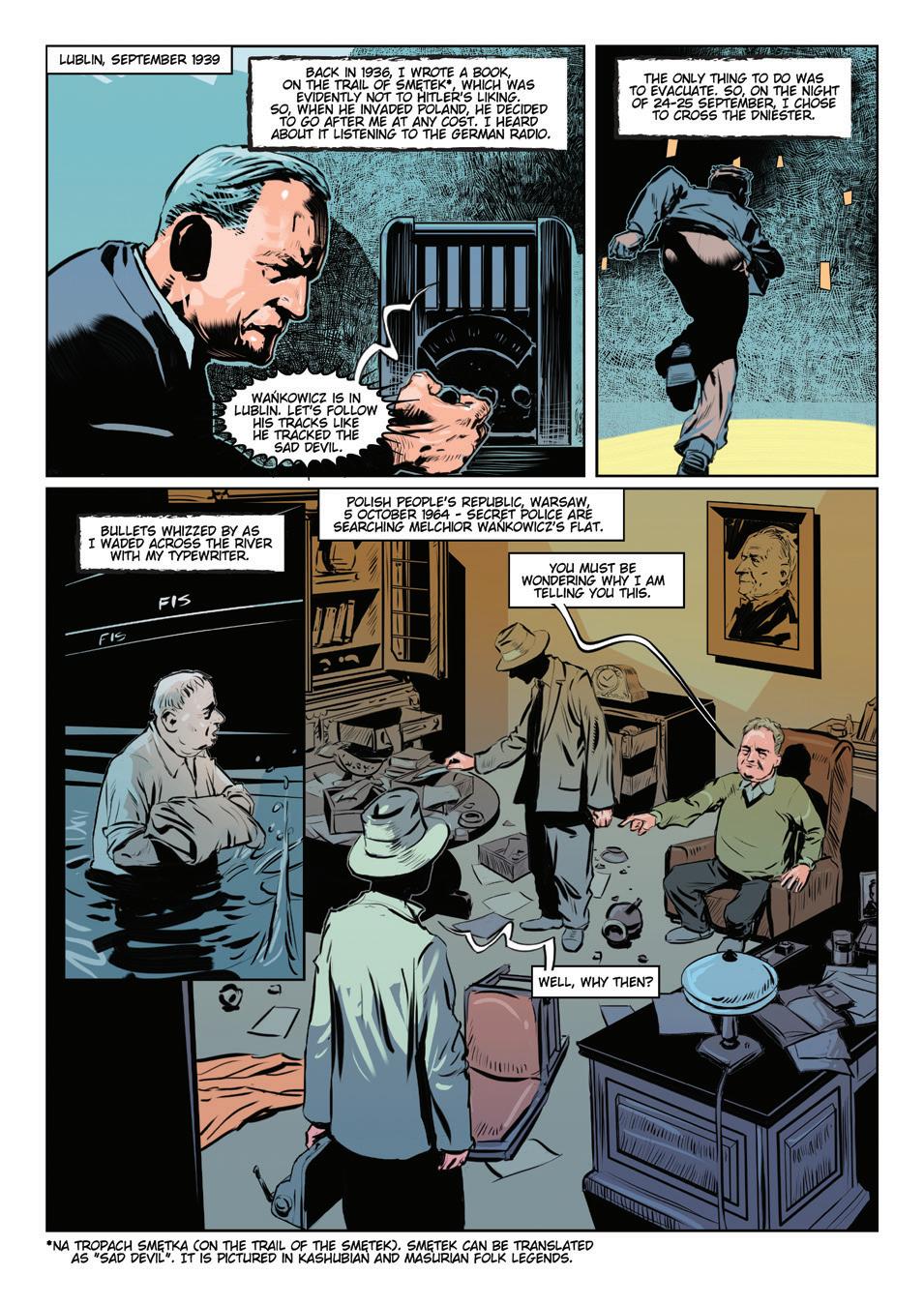

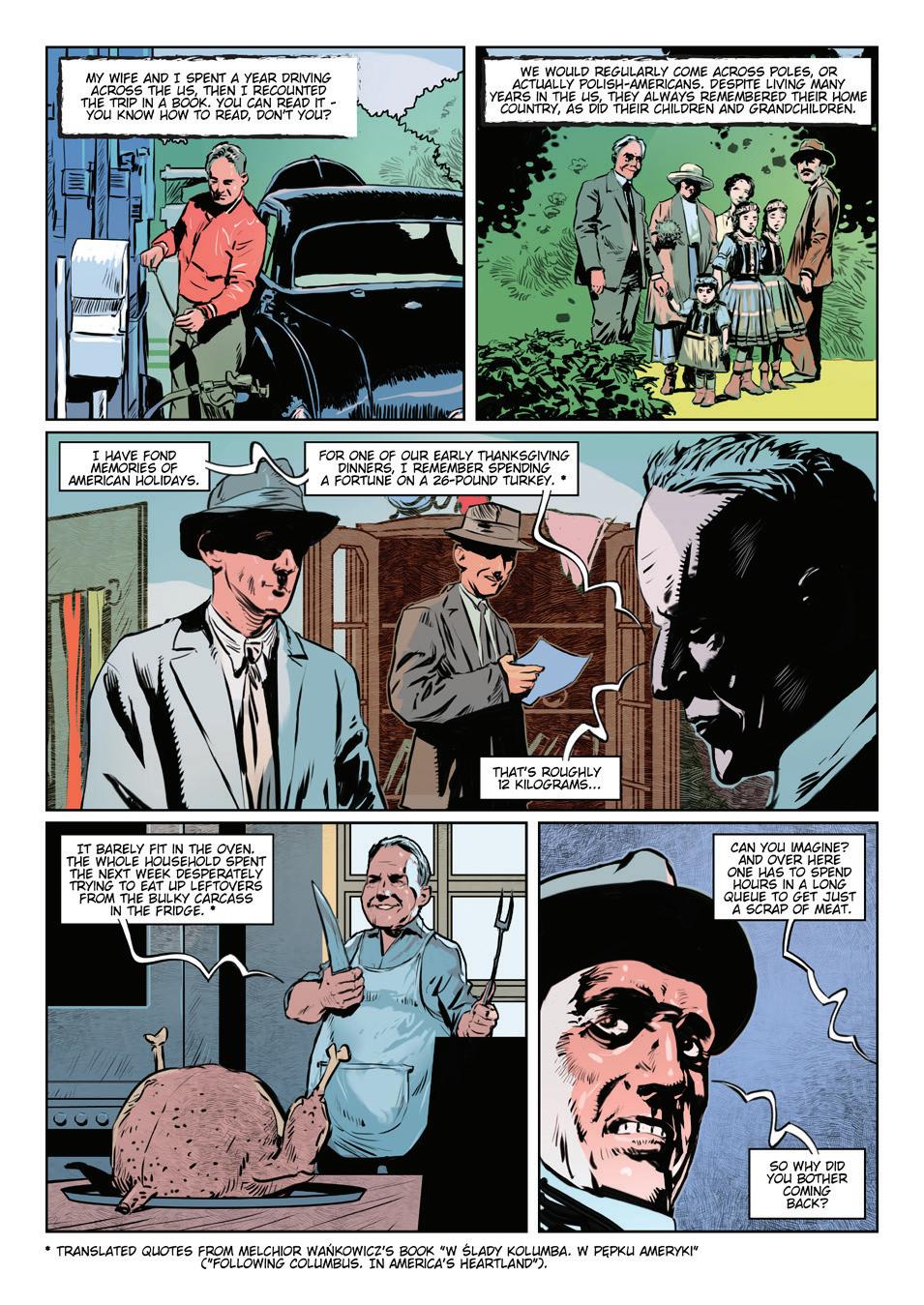




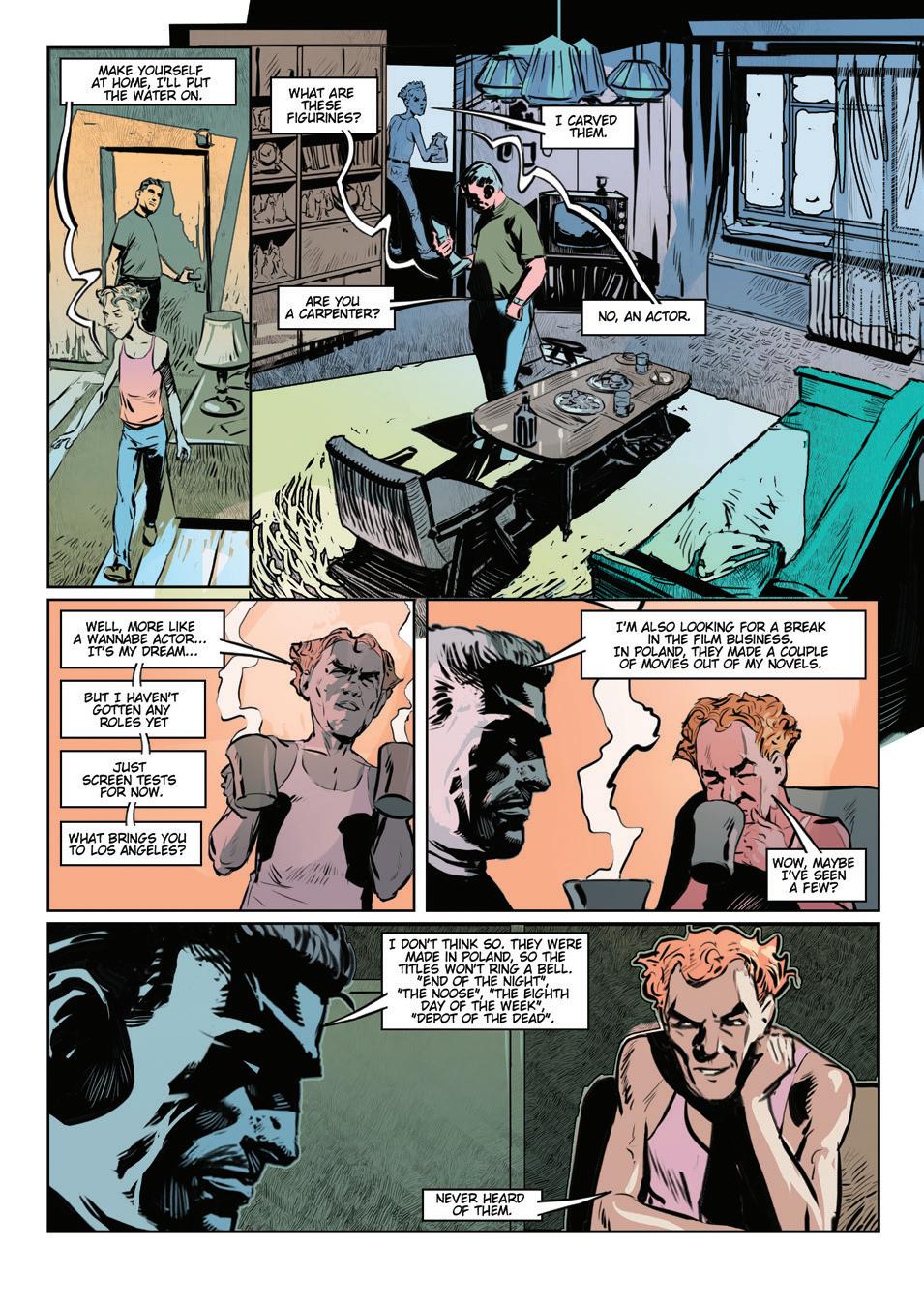



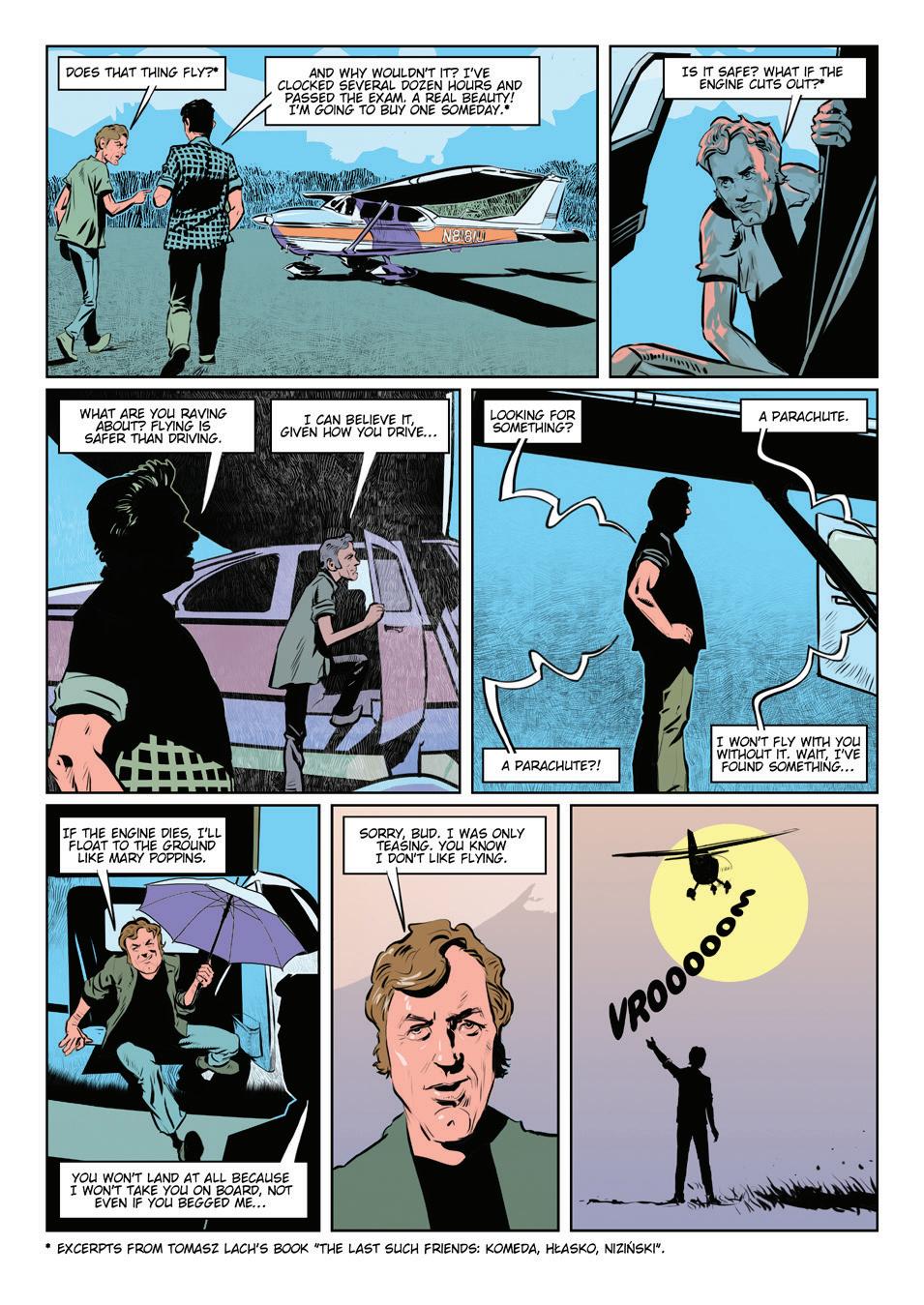






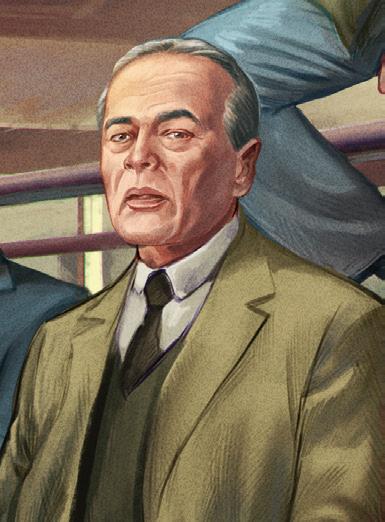
WITOLD GOMBROWICZ (1904-1969)
Avant-garde writer
Witold Gombrowicz left Europe in the summer of 1939 aboard the liner MS Chrobry, reporting a cruise to South America to which the Ministry of Industry and Trade treated men of letters. He already enjoyed great fame after his debut novel Ferdydurke made a splash in literary circles. The cruise left him stranded in Buenos Aires at the outbreak of World War II. He eventually landed a job at Banco Polaco and led a modest emigré life, dividing his time between the office and writing.
After the war, Gombrowicz opted not to return to Poland, which had fallen under communist rule. He was rediscovered by Paris-based editor and publisher Jerzy Giedroyć, whose Literary Institute published Gombrowicz’s works, including the novels Trans-Atlantyk (Trans-Atlantic), Pornografia (Pornography) and Kosmos (Cosmos), the drama Ślub (The Marriage), and excerpts from his voluminous Dziennik (Diaries). By the late 1950s, Gombrowicz had achieved a measure of international renown, with his works, which captivated readers with their poetics, translated into over 20 languages. Five years before his death, he returned to Europe and settled in France. In 1968 we was nominated for the Nobel Prize in Literature but lost by just one vote to the Japanese novelist Yasunari Kawabata.
MELCHIOR WAŃKOWICZ (1892-1974)
War correspondent
Melchior Wańkowicz was forced to flee by the Nazi German and Soviet invasions of Poland that set off World War II. Working as a war correspondent, he crossed the Polish-Romanian border on 24 September 1939. Three years earlier, he had been awarded the Polish Literary Academy’s Silver Laurel for his hugely popular works Szczenięce lata (Salad Days) and Na tropach Smętka (On the Trail of Smętek). From Romania Wańkowicz made his way to Palestine, where he enlisted in the Polish II Corps, a unit of the Polish Armed Forces in the West commanded by General Władysław Anders which fought alongside the Allies during the war. He took part in the Battle of Monte Cassino, for which he was awarded Poland’s Cross of Valour, and his collection of stories covering the bitter mountain fighting became the crowning achievement of his journalistic career. After the war, the writer settled down in the US, where he published a personal memoir, Ziele na kraterze (Herbs on a Crater). Even though he was granted US citizenship, Wańkowicz decided to return to Poland in May 1958. He was tolerated by the communist regime until he signed the “Letter of 34” in protest against rigid state censorship. The authorities then discovered that Wańkowicz had been writing articles for Radio Free Europe, an independent radio station broadcasting from Western Europe. In November 1964, Wańkowicz was sentenced to three years in prison, but the communist authorities did not dare implement the court judgement. Wańkowicz was never incarcerated and continued to enjoy both personal liberty and the admiration of his readers.


MAREK HŁASKO (1934-1969)
Literary Rebel
Marek Hłasko was in his early 20s when he burst upon the Polish literary scene as a popular short story writer, earning global recognition before he turned 30. When the writer departed for Paris in 1958, he left behind not only communist-ruled Poland but also countless admirers of his books Pierwszy krok w chmurach (The First Step in the Clouds) and Ósmy dzień tygodnia (The Eighth Day of the Week), as well as film adaptations of his short stories Pętla (The Noose) and Baza ludzi umarłych (Depot of the Dead). In Paris, he stayed with editor Jerzy Giedroyć, a leading figure among Polish political emigrants and founder of the renowned Literary Institute. The Polish communist authorities then withdrew The Eighth Day of the Week from the Cannes film festival and banned further publication of his works in Poland. Even so, Hłasko was already immensely popular in the West. Fearing the political consequences of returning home, he requested political asylum in West Germany. The writer married German film star Sonja Ziemann in 1962, while the Literary Institute published his autobiography, Piękni dwudziestoletni (Pretty Twenty-Year Olds) in 1966. After divorcing Ziemann in February 1966, Hłasko moved to the US to write screenplays but did not carve out a successful career in Hollywood. He returned to West Germany in 1969 and became a screenwriter for television broadcaster ZDF. A few months later Hłasko died following a collapse.
CZESŁAW MIŁOSZ (1911-2004)
Poet-Sage
Czesław Miłosz lived under both Nazi and communist totalitarian regimes in Poland before finding refuge from the latter in California. His memories of Europe’s nightmare inspired him to write the works that brought him the Nobel Prize. Before World War II, Miłosz studied in Vilnius, where he published his first volumes of poetry, Poemat o czasie zastygłym (A Poem on Frozen Time) and Trzy zimy (Three Winters). During the Nazi occupation, the poet lived in Warsaw, where he witnessed atrocities such as the destruction of the Warsaw ghetto, later immortalised in the poignant poem Campo di Fiori. After the war, Miłosz responded to a call by the Polish government for educated people to join the diplomatic service. In February 1951, while working as first secretary at the Polish embassy in Paris, he applied for asylum in France, where he published Zniewolony umysł (The Captive Mind), Zdobycie władzy (The Seizure of Power) and Dolina Issy (The Issa Valey). His poetry and novels won readers’ hearts all over the world.
In 1960, Miłosz was offered tenure at the University of California, Berkley. The move brought him growing popularity that culminated in the Nobel Prize in Literature in 1980. The prize allowed him to safely visit his homeland, where the Solidarity trade union was shaking the foundations of communist rule. Miłosz continued his teaching career in the 1980s at Harvard University. In 1993, the fall of communism allowed him to return to Poland for good, where Kraków replaced his beloved Vilnius as home during his final years.



